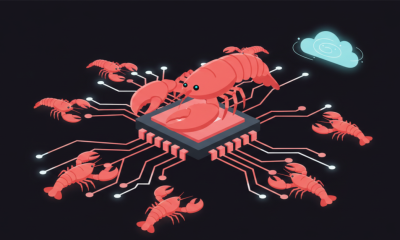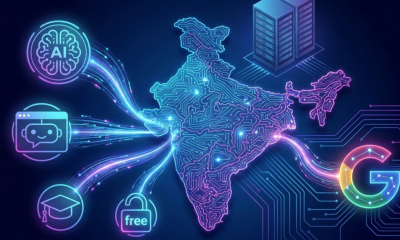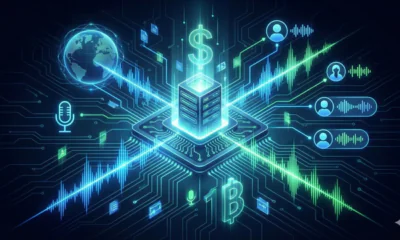Artificial Intelligence
Trillion-Dollar Vision: Sam Altman’s Global Chip Initiative

In an unprecedented move that could reshape the future of artificial intelligence, Sam Altman, CEO of OpenAI, is spearheading a colossal global fundraising initiative. The ambitious goal? To amass a staggering $5–7 trillion.
First reported by WSJ, this vast sum is earmarked for a groundbreaking venture: the development of semiconductor chips specifically tailored for AI applications. This initiative marks a significant leap in OpenAI’s strategic direction and underscores the increasing importance of specialized technology in the rapidly evolving landscape of AI.
The Scope of OpenAI’s Vision
At the heart of this monumental fundraising effort lies a clear objective: to overcome the pressing challenges of scaling and resource scarcity that currently hamper the AI industry. Semiconductor chips, the critical building blocks of AI systems, are in short supply, a situation exacerbated by their soaring costs.
OpenAI’s vision extends beyond mere financial accumulation. This endeavor is a strategic move to address these twin challenges head-on, ensuring that the development of high-level AI systems is not hindered by logistical bottlenecks.
The significance of semiconductor chips in the realm of AI cannot be overstated. These chips are not just components; they are the very cradle of AI’s potential, empowering systems to process and analyze vast amounts of data at unprecedented speeds. In essence, these chips are the engines that drive the advanced capabilities of AI, from deep learning to complex problem-solving. By focusing on the development and accessibility of these chips, OpenAI is laying the groundwork for a future where AI can achieve its full potential, unhindered by the limitations of current technology.
This ambitious project by OpenAI is more than an investment in hardware; it’s a testament to the company’s commitment to overcoming the most pressing challenges in AI development. By addressing the scarcity and cost of semiconductor chips, OpenAI is not just envisioning a new era of AI capabilities but actively forging the path to make it a reality.
Strategic Partnerships and Global Collaboration
Sam Altman’s approach to this colossal task is a masterclass in strategic alliance and global collaboration. Recognizing the multifaceted nature of this challenge, Altman is reaching out to a diverse array of partners: investors, chip makers, and energy providers. This varied consortium is not just about pooling financial resources; it’s about integrating expertise from different sectors to create a holistic solution for AI development.
A key element of this strategy is OpenAI’s commitment to being a major customer for the new chip factories. This promise serves a dual purpose: it acts as a catalyst for the production of these essential chips and provides a stable market for these new enterprises. By guaranteeing a significant demand, OpenAI is not only ensuring the success of its own venture but is also fostering the growth of a new industry sector that could revolutionize the production of AI-centric semiconductor chips.

Image: OpenAI
Government and Industry Involvement
The scope of OpenAI’s vision is such that it transcends the boundaries of private enterprise, necessitating involvement at the governmental level. Altman’s discussions with the United States Commerce Secretary, Gina Raimondo, and the UAE National Security Advisor, Sheikh Tahnoun bin Zayed al Nahyan, signify the project’s international and political relevance. These high-level meetings highlight the recognition of AI’s growing influence on national and global scales.
This initiative underscores the necessity of collaboration across various sectors and borders. It is not merely about the development of a product but about forging new paths in technological advancement, international cooperation, and economic growth. The involvement of governments alongside private entities reflects the understanding that the future of AI is a matter not just of corporate interest but of national and international importance. This collaboration could set a precedent for how global tech initiatives, especially those with far-reaching implications like AI, are approached and managed in the future.
Stakeholders and Industry Reactions
The scale and ambition of OpenAI’s project have drawn attention and involvement from some of the most influential players in the tech industry. Notably, SoftBank and Taiwan Semiconductor Manufacturing are among the entities reportedly in talks with Altman. Their potential involvement underscores the project’s significance, given their respective prowess in investment and chip manufacturing.
Microsoft’s role is particularly noteworthy. As a majority stakeholder in OpenAI, Microsoft’s support is a significant endorsement of the project. This backing from one of the world’s leading technology companies not only adds credibility to the endeavor but also provides a substantial resource and expertise pool to draw from.
The AI chip market, already a battleground for technological supremacy, is witnessing intensified competition with this move. Nvidia, the current market leader in AI computation chips, has been achieving record-breaking revenue, a testament to the growing demand in this sector. Furthermore, the recent entry of big tech company Meta, with its own AI chip “Artemis”, signals a broader and more competitive landscape. This competition underscores the rapidly increasing importance and potential profitability of specialized AI chip technology.
OpenAI’s bold project, spearheaded by Sam Altman, is more than a mere technological venture; it’s a paradigm shift in the AI industry. The ambitious aim to raise $5–7 trillion for developing AI-centric semiconductor chips is unprecedented in scale and scope. This initiative is about reshaping the infrastructure and resources necessary for the next generation of AI development.












